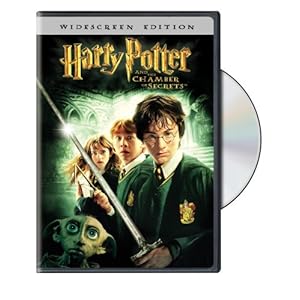 Released one year after the incredibly successful first film in the series, Harry Potter and the Chamber of Secrets opened in the U.S. in November of 2002. Sadly, this would be the last film in the series to feature Richard Harris as Dumbledore; he died just a month before the movie opened. Chamber of Secrets introduces the characters of Gilderoy Lockhart as the new Defense Against the Dark Arts teacher, Professor Sprout in Herbology, and a really mean basilisk in the titular Chamber. Oh, and a repressed house elf named Dobby with serious self-esteem issues.
Released one year after the incredibly successful first film in the series, Harry Potter and the Chamber of Secrets opened in the U.S. in November of 2002. Sadly, this would be the last film in the series to feature Richard Harris as Dumbledore; he died just a month before the movie opened. Chamber of Secrets introduces the characters of Gilderoy Lockhart as the new Defense Against the Dark Arts teacher, Professor Sprout in Herbology, and a really mean basilisk in the titular Chamber. Oh, and a repressed house elf named Dobby with serious self-esteem issues.
Chamber of Secrets is certainly a darker film than Sorceror’s Stone, with considerably more blood and peril, and although no one actually dies, the threat of petrification is pretty ominous. And we’re introduced to Moaning Myrtle, the ghost of a girl who was killed the last time the Chamber of Secrets was opened.
Chris Columbus returned to direct the 2nd film, and once again, stayed as close to the source material as a two-and-a-half-hour movie would allow. A.O. Scott in the New York Times admitted this was a smart decision, saying “my fellow critics and I may occasionally fault a movie for departing, in detail or in spirit, from its literary source, but the grousing of a few adult pedants is nothing compared to the wrath of several million bookish 10-year-olds.” Scott, although admitting Chamber of Secrets is a better film than its predecessor, says it shares some faults with Sorceror’s Stone; a plodding pace and overreliance on spectacle. “The sense of a dramatic crescendo is lost, so that by the end, instead of feeling stirred to a high pitch of anxiety and excitement, you may feel battered and worn down.”
Jess Cagle of Time Magazine also said the film suffers from trying to tell too much story. “Although Chamber of Secrets‘ pacing is more lively than the first film’s, it still drags at times,” he writes. “Columbus is intent on getting as much of the book on screen as possible, and the movie inevitably creaks under the weight of Rowling’s imagination.“
This is definitely a bigger movie, both in story and setting. Roger Ebert of the Chicago Sun-Times writes “Hogwarts itself seems to have grown since the first movie, from a largish sort of country house into a thing of spires and turrets, vast rooms and endlessly convoluted passageways, lecture halls and science labs, with as much hidden below the ground as visible above it.” And although the third act of the film favors extended action-thriller sequences over plot, Ebert says it works “because it has been pointing toward this ending, hinting about it, preparing us for it, all the way through.”
Though not as successful as the first film, Chamber of Secrets earned over $260 million at the U.S. box office, making it the 4th highest-grossing film of 2002. Fans would have to wait 19 months for the next film in the series, Harry Potter and the Prisoner of Azkaban. Fortunately, the 5th book in the series, Harry Potter and the Order of the Phoenix would come out a year earlier, in June 2003.
